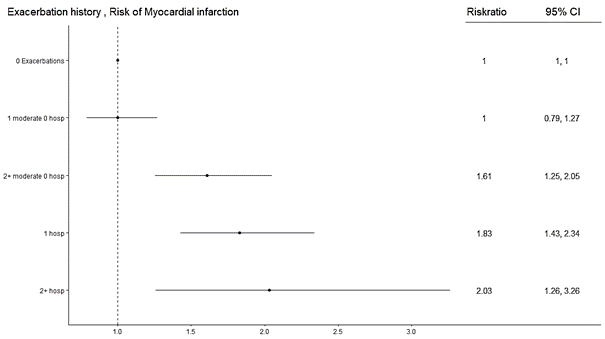Abstract
Introduction: Acute exacerbations of COPD, (AECOPDs) are increasingly recognized as episodes of heightened short-term cardiovascular risk. However, it is not known whether exacerbation history is differentially associated with future myocardial infarction (MI).
Aims and objectives: To investigate the risk of MI in a Swedish COPD-patient cohort stratified by number and severity of AECOPDs in the year before the index date.
Methods: We identified 36385 patients with a primary diagnosis of COPD, aged ? 30 years, from their latest visit registered in the Swedish National Airway Register January 2014 to August 2020 with complete data on lung function, smoking history, and body mass index (BMI) (index date). Patients were stratified by moderate (prescription of oral corticosteroids) and severe (hospitalization) exacerbations in their history the year before index date and were followed until January 2021 for hospitalization or death from MI. Competing risk regression was used to calculate risk ratios (RR) for MI in each exacerbation-history-stratum.
Results: Compared to patients without AECOPDs, the RR for MI, increased with frequency and severity of exacerbation history, adjusted for age, sex, FEV1% of predicted, BMI, smoking and history of cardiovascular disease, (Figure):
Conclusion: Increasing frequency/severity of AECOPDs is associated with future risk of MI.